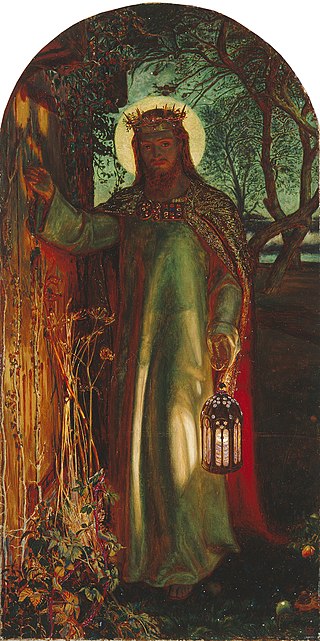John Camm may refer to:
- John Camm (Anglican priest) (1718–1778), president of the College of William & Mary
- John Camm (Quaker preacher) (1604/5–1657), English Quaker preacher and writer
John Camm may refer to:

George Fox was an English Dissenter, who was a founder of the Religious Society of Friends, commonly known as the Quakers or Friends. The son of a Leicestershire weaver, he lived in times of social upheaval and war. He rebelled against the religious and political authorities by proposing an unusual, uncompromising approach to the Christian faith. He travelled throughout Britain as a dissenting preacher, performed hundreds of healings, and was often persecuted by the disapproving authorities. In 1669, he married Margaret Fell, widow of a wealthy supporter, Thomas Fell; she was a leading Friend. His ministry expanded and he made tours of North America and the Low Countries. He was arrested and jailed numerous times for his beliefs. He spent his final decade working in London to organise the expanding Quaker movement. Despite disdain from some Anglicans and Puritans, he was viewed with respect by the Quaker convert William Penn and the Lord Protector, Oliver Cromwell.

Sir Sydney Camm, CBE, FRAeS was an English aeronautical engineer who contributed to many Hawker aircraft designs, from the biplanes of the 1920s to jet fighters. One particularly notable aircraft he designed was the Hawker Hurricane fighter.

Inward light, Light of God, Light of Christ, Christ within, That of God, Spirit of God within us, Light within, and inner light are related phrases commonly used within the Religious Society of Friends (Quakers) as metaphors for Christ's light shining on or in them. It was propagated by the founder of the Quaker movement, George Fox, who "preached faith in and reliance on 'inward light' ". The first Quakers were known to sit in silence and meditate on the words of the Bible until they felt the inward light of God shining upon them and the Holy Spirit speaking. The concept was highly important to early Quakers, who taught: "God reveals Himself within each individual's conscience and consciousness by the Holy Spirit, Christ Himself being the Light to illuminate man's sinfulness and lead in the way of truth and righteousness. ... this light is in all men by the grace of God to lead them to Christ, and that the same light will give daily guidance to the Christian."

Mary Dyer was an English and colonial American Puritan turned Quaker who was hanged in Boston, Massachusetts Bay Colony, for repeatedly defying a Puritan law banning Quakers from the colony. She is one of the four executed Quakers known as the Boston martyrs.
Hodgkin is a surname. Notable people with the surname include:

Elberton is a small village and former civil parish, now in the parish of Aust, in the South Gloucestershire district, in the ceremonial county of Gloucestershire, England. In 1931 the parish had a population of 137.

Quaker views on women have always been considered progressive in their own time, and in the late 19th century this tendency bore fruit in the prominence of Quaker women in the American women's rights movement.

Quakers are people who belong to a historically Protestant Christian set of denominations known as the Religious Society of Friends. Members of these movements are generally united by a belief in each human's ability to experience the light within or see "that of God in every one". Some profess a priesthood of all believers inspired by the First Epistle of Peter. They include those with evangelical, holiness, liberal, and traditional Quaker understandings of Christianity. There are also Nontheist Quakers, whose spiritual practice does not rely on the existence of God. To differing extents, the Friends avoid creeds and hierarchical structures. In 2017, there were an estimated 377,557 adult Quakers, 49% of them in Africa.
The divine spark is a term used in various different religious traditions.

Plain dress is a practice among some religious groups, primarily some Christian churches in which people dress in clothes of traditional modest design, sturdy fabric, and conservative cut. It is intended to show acceptance of traditional gender roles, modesty, and readiness to work and serve, and to preserve communal identity and separation from the immodest, ever-changing fashions of the world. For men, this often takes the form of trousers secured by suspenders, while for women, plain dress usually takes the form of a cape dress along with a headcovering.
Camm or CAMM may refer to:

Dom Bede Camm, O.S.B., was an English Benedictine monk and martyrologist. He is best known for his many works on the English Catholic martyrs, which helped to keep their memories alive in the newly reemerging Catholic Church of Victorian England.
John Camm (1718–1778) was an Anglican priest who served as the seventh president of the College of William and Mary. He was a fierce Tory advocate of the prerogative of the Crown and the established Church.
Henry Winder was an English nonconformist minister and chronologist.
Anne Camm was an early English Quaker preacher.
Barbara Blaugdone was an English Quaker preacher, who left an autobiographical account of her travels, evangelism, and religious and political views. She was imprisoned several times for preaching her beliefs.
Thomas Camm (1640/41–1708) was an English Quaker minister and writer. He was imprisoned for not paying tithes in 1674; fined for unlicensed preaching in 1678; and imprisoned, probably for preaching, from 1680 to 1686. He published religious tracts.
John Camm (1604/5–1657) was an early English Quaker preacher and writer. He joined the Quakers in 1652; came to London to interview Cromwell in 1654; and visited Bristol and London in 1656. He published religious tracts.
Dorothy Waugh was an English Quaker preacher who was twice a missionary to North America. She wrote a rare account of the use of a Scold's bridle during one of her many imprisonments.